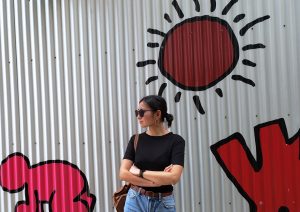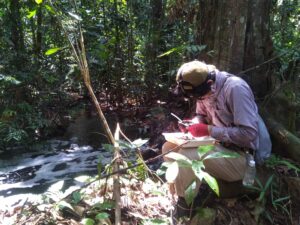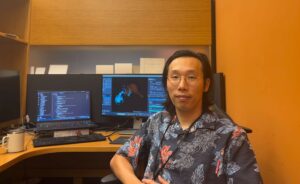Evan P. Economo | Chisa Oshiro | Lazzat Aibekova | Karen Kohama | Riou Mizuno | Yichen He | Eli Sarnat
Chisa Oshiro, Research Unit Administrator

I was born in Okinawa but went to the United States to study American Literature with a focus on environmental literature. I wrote about the relationship between humans and nature by comparing the thoughts of great authors, artists, and architects. I also wrote about culture, language, and identity. The mixture of these ideas gave me the desire to return to Okinawa with the goals of spreading public education, preserving nature, and improving self-reliant economic development in Okinawa. I am overjoyed to have the opportunity to pursue these goals at OIST by using my past administrative experience to help the everyday operations of Arilab’s research.
Lazzat Aibekova, PhD Graduate

I’m Lazzat, from Kazakhstan. Before entering OIST, I studied at Nazarbayev University in Kazakhstan. For my undergraduate thesis I studied the evolution and epidemiology of HIV in Former Soviet Union countries. Here at OIST, during my rotations, I developed an interest in the evolutionary and ecological processes that shaped biodiversity. For my PhD I want to focus on biodiversity, biogeography and altitudinal adaptation of montane ants in Kazakhstan.
Karen Kohama, Research Technician
 I recently completed my undergraduate studies at The City College of New York and worked as a research intern in the Economo Unit. As an undergraduate, I studied the spatial diversity patterns of butterflies in the Philippines. When I was an intern, I transitioned to learn more about insect morphology and geometric morphometric methods, primarily focusing on Philippine butterfly wing and body size. Now as a research technician in the Arilab, I hope to support the lab through specimen curation, micro-CT scanning, and morphological segmentations.
I recently completed my undergraduate studies at The City College of New York and worked as a research intern in the Economo Unit. As an undergraduate, I studied the spatial diversity patterns of butterflies in the Philippines. When I was an intern, I transitioned to learn more about insect morphology and geometric morphometric methods, primarily focusing on Philippine butterfly wing and body size. Now as a research technician in the Arilab, I hope to support the lab through specimen curation, micro-CT scanning, and morphological segmentations.
Riou Mizuno, Postdoctoral Researcher

I am a natural history researcher interested in the evolution and diversification of life history traits of ants (social structure, morphological specialization, caste polymorphism, etc.). I am approaching this theme through fieldwork (observations and collections) and laboratory observations (observations and experiments with captive colonies). I describe the natural history of social and behavioral traits of ant species and discuss evolutionary history by comparing these traits.
From my undergraduate studies to Ph. D., I studied the life history of the non-army ant group of the subfamily Dorylinae at Kagawa University, Japan. I experienced fieldwork in tropical Southeast Asia, especially in Thailand, Malaysia, and Vietnam. During my master’s program, I spent one year at Chiang Mai University in Thailand as part of my Double Degree Program.
At Arilab, I will combine my natural history research approach with morphology using μCT to investigate the evolution of complexity in insect societies by comparing life history traits, behavior, and morphology. Specific projects will include 1) hunting tactics of the genus Strumigenys with their mandible morphology, and 2) the specialization of the life history traits and morphology of Dorylinae army ants.
Yichen He, Postdoctoral Researcher
I am a researcher working at the interface between computer science and biology. I completed my PhD at the University of Sheffield, where I developed AI and computer vision methods to study biodiversity and evolution, focusing on understanding global variation in plumage colour and ultraviolet reflectance in birds.
After my PhD, I worked as a postdoctoral researcher at the Natural History Museum in London and the University of Sheffield, focusing on segmentation, phenotyping, and developing open-source tools that make deep learning methods more accessible for biologists. I have experience working with diverse data types, including 2D specimen images, cross-sectional images (e.g. micro-CT), and 3D meshes.
At OIST, I am working in the Arilab to generate fine-grained datasets from ant scans, such as part-level segmentations, and to explore new morphometric approaches for analysing phenotypic diversity.
I am passionate about learning new computational models and exploring how they can be applied across different types of biological data.
For more information, please visit my GitHub: https://github.com/EchanHe
Eli Sarnat, Taxonomist-at-Large
 My current research focuses on better understanding the diversity of Pacific island ant faunas and preventing the spread of invasive ant species across the globe. I study the evolution, systematics and biogeography of Pacific ants, especially those of the Fijian archipelago. I am also developing identification guides to invasive, introduced and commonly intercepted ant species to help researchers, quarantine personnel and conservationists prevent their spread. I work on projects remotely from my solar-powered cybertaxomony lab in the Klamath-Sikisi mountains of Northern California.
My current research focuses on better understanding the diversity of Pacific island ant faunas and preventing the spread of invasive ant species across the globe. I study the evolution, systematics and biogeography of Pacific ants, especially those of the Fijian archipelago. I am also developing identification guides to invasive, introduced and commonly intercepted ant species to help researchers, quarantine personnel and conservationists prevent their spread. I work on projects remotely from my solar-powered cybertaxomony lab in the Klamath-Sikisi mountains of Northern California.

